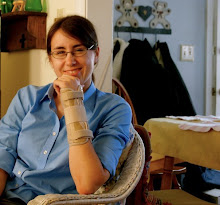The chapter to which I refer is an excerpt from St. Paul's first letter to the people of Corinth. It addresses doubts that have been raised among the people regarding the feasibility of the resurrection of the dead. After two highly significant sections-- the oft-quoted "Love Chapter" and a section on the gifts of prophecy and tongues-- Paul jumps in with both feet to attempt to quell the Corinthians' doubts about the resurrection.
I'd like to first back up and note that at the end of Chapter 13 and the beginning of Chapter 14, Paul says this (I'm using Eugene Peterson's "The Message" translation here):
But for right now, until that completeness, we have three things to do to lead us toward that consummation: Trust steadily in God, hope unswervingly, love extravagantly. And the best of the three is love. Go after a life of love as if your life depended on it-- because it does. Give yourselves to the gifts God gives you. Most of all, try to proclaim his truth.This passage grabbed me tonight. I like the phrasing Peterson uses (although the original English translations are also of course beautiful) and I find the direction profoundly simple yet somehow very difficult. "Love extravagantly." "Give yourself to the gifts God gives you." "Proclaim his truth." These are never as easy as they sound. Something is always getting in the way or getting lost in the shuffle. And yet these are core principles. I think the instructions can perhaps be best summarized by a St. Francis of Assisi quote: "Preach the Gospel at all times. Use words if necessary." Using words, that is precisely what Paul did, one chapter down the road.
Resurrection-- the idea of the
Paul started out with a bang, reminding the Corinthians that they had accepted, "taken their stand on," his teachings as something which had saved them. These teachings-- that Christ lived, died, and rose again-- are the very bedrock of the Christian faith, and if they are false then the whole thing is pointless and all the believers are just wasting their time.
I think that might be the first idea that really grabbed my attention. Paul effectively says that if what we believe is wrong, we've wasted our lives. No side benefits, no minor perks, no reassurances. Everything hangs on this.
Thanks, Paul. Now that you've caught my attention, what's next?
Well, lest you think him arrogant or less than authoritative, Paul establishes his credibility and simultaneously takes himself down a few pegs:
Last of all he appeared to me also, as to one abnormally born. For I am the least of the apostles and do not even deserve to be called an apostle, because I persecuted the church of God. But by the grace of God I am what I am, and his grace to me was not without effect. No, I worked harder than all of them-- yet not I, but the grace of God that was with me.I actually really have been grabbed by this section too-- the humility and yet acknowledgment of having put in hard work. I can relate to the feeling "By the grace of God I am what I am," knowing that your past wasn't perfect but it did get you to today and you will press forward, secure in God's love. It is really a sustaining and secure feeling when it surfaces...which I have to admit is less frequently than I would like. The rest of the time it's more of a sense that the universe is moving along whehter or not you know it, so it's better simply to accept things.
Back to the resurrection-- Paul continues to hammer his point home. That point is effectively, "If there is no resurrection from the dead, then Jesus isn't alive and your faith is worthless." Disconcerting point. Every Easter-- and many other days of the Christian calendar for that matter-- we celebrate Jesus being alive, so I guess to some degree we've accepted the whole resurrection thing, despite all its challenges.
It intrigues me, really. The foundation of one of the world's greatest religions, believed by millions of men and women the world over for the past thousand years, is a concept that would easily make the top ten of improbable events. We don't see the dead rise, we have little cause to believe it possible or probable...so why are we so okay with Jesus doing it every Easter? Actually, if you ask me, we're a little too comfortable with it. Come the end of Lent every spring, we sing our songs, eat our chocolate, and go securely on our way without really thinking about it. We are celebrating a person who was fully dead coming fully back to life! Cause to celebrate, to be sure, but shouldn't we be thinking more about what that MEANS?
It means that the universe as governed by physics and biology is no longer playing by the rules. It means death is no longer the end of life, but merely a stumbling block (if that) between lives. The old playbook is gone. Jesus is still, today, out of the tomb, and the rules are different. He not only broke the rules, he changed them. We are free to do what Paul said earlier-- to love extravagantly. To proclaim truth. To pursue our gifts. To hope unswervingly. To trust steadily in God. Because those of us who accept this have a reason to trust God, to home in him, to love him and others: He loved us and as a result did whatever it took to change the rules in our favor. Death is not an obstacle, nor should life be. Love extravagantly-- that's what being alive in God is all about.

No comments:
Post a Comment